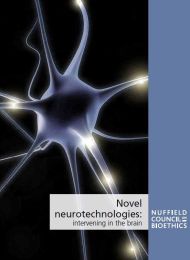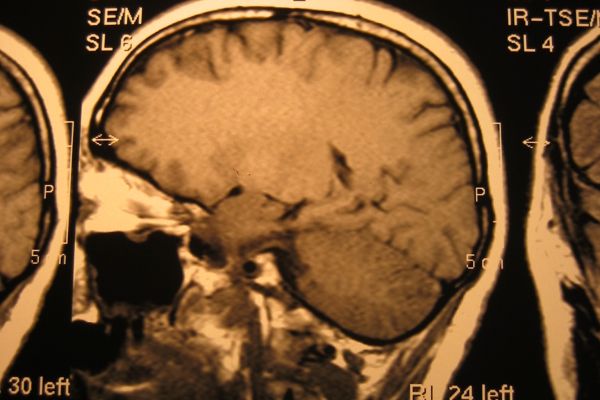Novel neurotechnologies: intervening in the brain
Report
Published 24/06/2013

Professor Thomas Baldwin (Chair)
Professor of Philosophy, University of York
Tom Baldwin works across a broad range of issues in contemporary philosophy, including bioethics, and is currently editor of Mind, the leading philosophy journal. He has been a member of the Human Genetics Commission (HGC), the Human Fertilisation and Embryology Authority (HFEA), and the Department of Health’s expert advisory committee on obesity. He is a co-opted member of the Nuffield Council on Bioethics for the duration of the Working Party on novel neurotechnologies, and has previously contributed to the Council’s reports on stem cells, patenting DNA, genetics and behaviour and public health.
Professor Jonathan Cole
Honorary Senior Lecturer in Clinical Neurosciences, University of Southampton; Professor, Centre for Postgraduate Medical Research and Education and the School of Design, Engineering and Computing, University of Bournemouth; Clinical Neurophysiology Consultant, Poole Hospital
Jonathan Cole’s academic research has focused on the effects of sensory deafferentation and motor control. He leads a group at the University of Bournemouth investigating the use of virtual reality therapeutically in neurological impairment, and is part of the Economic and Social Research Council (ESRC) network on Brain-Computer interfaces (BCIs).
Professor Maria Fitzgerald
Professor of Developmental Neurobiology, University College London
Maria Fitzgerald is a Fellow of the Academy of Medical Sciences, a current member of the Council of the British Pain Society and the Biological Sciences panel of the UK Research Assessment Exercise (REF), and a past member of the MRC Neuroscience and Mental Health Board and of French and Norwegian national research agencies. Her research focuses on neural mechanisms of pain in infants and children.
Professor Jenny Kitzinger
Professor of Communications Research, Cardiff School of Journalism, Media and Cultural Studies, Cardiff University
Jenny Kitzinger comes from a background in social and political sciences, anthropology and communications studies. Her work focuses on examining social and ethical debates around science and medicine. Her previous research has examined issues such as human genetics, stem cell research, and serious brain injury. Recent appointments include serving on the Royal College of Physicians Working Party on the management of disorders of consciousness. She is a Member of Cesagen (The ESRC Centre for Economic and Social Aspects of Genomics).
Professor Graeme Laurie
Professor of Medical Jurisprudence and Director of Research, School of Law, University of Edinburgh
Professor Graeme Laurie FRSE FMedSci is a Council member and Founding Director of the JK Mason Institute for Law, Medicine and Life Sciences at the University of Edinburgh.
Graeme is a lawyer with research interests in medical law and intellectual property law. He has previously served as Chair of the UK Biobank Ethics and Governance Council and is current Chair of the Privacy Advisory Committee in Scotland. He is member of the BMA Medical Ethics Committee and sits on a Working Party of the Royal Society examining Science as an Open Enterprise.
Professor Jack Price
Professor of Developmental Neurobiology and Director, Centre for the Cellular Basis of Behaviour, King’s College London
Jack Price is a neuroscientist with a specific interest in stem cells. His research is pursuing stem cells both as therapeutics for neurodegenerative diseases, and as cellular models of neurodevelopmental disorders. He also acts as consultant to ReNeuron Ltd, a UK Biotech company developing stem cells for therapeutic and drug discovery applications.
Professor Nikolas Rose
Professor of Sociology and Head of Department of Social Science, Health and Medicine, King’s College London
Nikolas Rose initially trained as a biologist and psychologist. His current research is on the social and political implications of the new sciences of the brain. He is a Council member, and has previously contributed to reports on personalised healthcare and pharmacogenetics.
Professor Steven Rose
Emeritus Professor of Neurobiology, Department of Life, Health and Chemical Sciences, Open University and Emeritus Professor, Genetics and Society, Gresham College, London
Steven Rose is a neuroscientist whose research has focussed on the molecular and cellular mechanisms of learning and memory. His books include The 21st Century Brain, Lifelines and The Making of Memory, and, with Hilary Rose, Genes, Cells and Brains: the promethean promises of the biosciences (in press). He has received several awards, including the Edinburgh Medal and the silver medal of the Scottish Royal Society of Arts. He has had a long term engagement with the ethical, legal and social aspects of the neurosciences, and was for several years a regular panelist on the BBC’s Moral Maze.
Professor Ilina Singh
Professor of Science, Ethics and Society, Department of Social Science, Health and Medicine, King’s College London
Ilina Singh has a doctorate in Human Development and Psychology from Harvard University, and spent four years as an affiliated lecturer in Social and Political Sciences at the University of Cambridge before moving to the LSE in 2004 and Kings College London in 2012. Ilina’s work explores the psycho-social and ethical implications of advances in bioscience and biomedicine for young people and families. Her current projects focus on psychotropic drugs, neuroimaging, cognitive and other forms of enhancement, and biomarkers associated with the development of criminality, psychopathy and psychiatric disorder.
Professor Vincent Walsh
Professor of Human Brain Research, Institute of Cognitive Neuroscience, University College London
Vincent Walsh is interested in all aspects of visual cognition including: visual search; awareness; motion and colour perception; eye movements; and visual memory. He also studies the perception of time; numerical representation; synaesthesia; plasticity in visual and motor systems; and all aspects of human brain stimulation, including DBS and TMS. He is on the Editorial Board for the journal Brain Stimulation: Basic, Translational, and Clinical Research in Neuromodulation.
Professor Kevin Warwick
Professor of Cybernetics, University of Reading
Kevin’s studies have focused on direct interfaces between computer systems and the human nervous system, as well as artificial intelligence, control systems and robotics. He presently heads a research project supported by the Engineering and Physical Sciences Research Council which investigates the use of machine learning and artificial intelligence techniques in order to suitably stimulate and translate patterns of electrical activity from living cultured neural networks in order to utilise the networks for the control of mobile robots. He heads the University of Reading team in a number of European Community projects such as FIDIS looking at issues concerned with the future of identity and ETHICBOTS which is considering the ethical aspects of robots and cyborgs.

Share